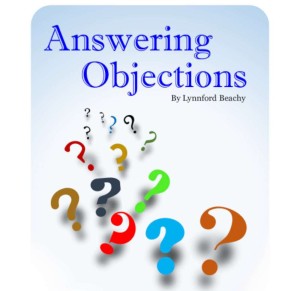 Introduction
Introduction
This is a companion book to the book entitled, Understanding the Personality of God. In that book we examined what the Bible says about God, His Son, and His Holy Spirit, as well as the death of Christ. We have seen that the doctrine of the trinity (the idea that God is composed of three persons) is not compatible with the biblical evidence. Yet, there are Bible verses that are often used to support the idea of the trinity. In our studies we have examined some of these verses, but there are several more. In this book we would like to examine all of the texts that are most commonly used to support the trinity and see if they really say what trinitarians would have us believe.
I recently watched a video presentation by a man with the unfortunate and difficult task of trying to prove the trinity from the Bible. This man stated, “If all you had was the Old Testament, I am going to go on record as saying, You would not emerge from the study of the Old Testament as a trinitarian.” He said all you would have are “hints” and “suggestions” concerning the plurality of God (David Asscherick, video series entitled, “The Unknown God,” part 2 of 5).
If the trinity is actually a true doctrine, this is a startling statement. It would mean that all the great men of the Old Testament lived and died without any knowledge that God was composed of three persons. The list of men would include King David, whom God said was “a man after his own heart” (1 Samuel 13:14). It would include Daniel, who was thrown into the lion’s den and was miraculously saved, as well as Moses “whom the Lord knew face to face” (Deuteronomy 34:10). This list would also include Enoch, who “was translated that he should not see death” (Hebrews 11:5), and Elijah, who was taken by “a chariot of fire” and “went up by a whirlwind into heaven” (2 Kings 2:11). There is no indication that any of these men thought that God is a trinity.
If these men could live like they lived, and even be translated into heaven without seeing death, even though they did not believe in the trinity, how has it become such a “sacred cow” among Christians? This theory has become so revered that a few days ago a man told me, “Trying to understand the trinity will make you lose your mind, but denying it will make you lose your soul.” Many people actually believe that if you do not believe in the trinity you will go to hell. Yet, the Bible record demonstrates that the three men whom we know to have already gone to heaven (Enoch, Elijah and Moses – Genesis 5:24; Hebrews 11:5; 2 Kings 2:11; Luke 9:28-30; Jude 1:9) were all non-trinitarian.
The admission that the Old Testament does not contain the doctrine of the trinity is not isolated to this one preacher. Here are some examples of what many authors say about the trinity in the Bible.
“Careful reading of The Old Testament shows no indication of the trinity itself…” (An Introduction to the Christian Faith, Oxford, England: Lynx Communications, 1992).
“The Old Testament does not plainly and directly teach The Trinity, …” (Myer Pearlman, Knowing the Doctrines of the Bible, Missouri, USA: Gospel Publishing House, 1981).
“The doctrine of The Holy Trinity is not taught in The Old Testament” (New Catholic Encyclopedia, p. 306).
“For nowhere in the Old Testament do we find any clear indication of a Third Person. Mention is often made of the Spirit of the Lord, but there is nothing to show that the Spirit was viewed as distinct from Jahweh Himself” (George Joyce, “The Blessed Trinity,” The Catholic Encyclopedia, Vol. 15, New York: Robert Appleton Company, 1912. Online at www.newadvent.org/cathen/15047a.htm).
“Exegetes and theologians today are in agreement that the Hebrew Bible [Old Testament] does not contain a doctrine of the Trinity, even though it was customary in past dogmatic tracts on the Trinity to cite texts like Genesis 1:26, ‘Let us make humanity in our image, after our likeness’ (see also Gn. 3:22, 11:7; Is. 6:23) as proof of plurality in God. Although the Hebrew Bible depicts God as the father of Israel and employs personifications of God such as Word (davar), Spirit (ruah), Wisdom (hokhmah), and Presence (shekhinah), it would go beyond the intention and spirit of the Old Testament to correlate these notions with later trinitarian doctrine” (Mircea Eliade, “Trinity,” The Encyclopedia of Religion, Vol. 15, p. 53-57).
Not only do most theologians agree that the Old Testament does not contain the doctrine of the trinity, many will admit that the New Testament also omits this doctrine. The Encyclopedia of Religion continues, “Further, exegetes and theologians agree that the New Testament also does not contain an explicit doctrine of the Trinity. God the Father is source of all that is (Pantokrator) and also the father of Jesus Christ; ‘Father’ is not a title for the first person of the Trinity but a synonym for God. Early liturgical and creedal formulas speak of God as ‘Father of our Lord Jesus Christ’…” (Ibid.)
“Trinity, in Christian doctrine, the unity of Father, Son, and Holy Spirit as three persons in one Godhead. Neither the word Trinity nor the explicit doctrine appears in the New Testament, nor did Jesus and his followers intend to contradict the Shema in the Hebrew Scriptures: “Hear, O Israel: The Lord our God is one Lord” (Deuteronomy 6:4).” (Encyclopædia Britannica Online, article: “Trinity,” Online at, www.britannica.com/EBchecked/topic/ 605512/Trinity.)
“The doctrine of the Trinity is not found in the Bible” (Prof. Shirley C. Guthrie Jr., Christian Doctrine, p. 80).
There are a multitude of quotations from many theologians stating that both the Old and New Testaments do not contain an explicit doctrine of the trinity. Instead this doctrine came into mainstream Christianity many years after the Bible was written. The Catholic church states, “The mystery of the Trinity is the central doctrine of the Catholic Faith. Upon it are based all the other teachings of the Church. The Church studied this mystery with great care and, after four centuries of clarification, decided to state the doctrine in this way: in the unity of the Godhead there are three Persons, the Father, the Son, and the Holy Spirit” (Handbook for Today’s Catholic, p. 11).
“The Church began to formulate its doctrine of The Trinity in the fourth century” (Louis Berkhof, Systematic Theology, Eerdmans Publishing, 1996, p. 82).
“The Bible does not teach the doctrine of the Trinity. Neither the word ‘trinity’ itself nor such language as ‘one-in-three,’ ‘three-in-one,’ one ‘essence’ (or ‘substance’), and three ‘persons’ is biblical language. The language of the doctrine is the language of the ancient church taken from classical Greek philosophy” (Prof. Shirley C. Guthrie Jr., Christian Doctrine, p. 76, 77).
“But many doctrines are accepted by evangelicals as being clearly taught in the Scripture for which there are no proof texts. The doctrine of the Trinity furnishes the best example of this. It is fair to say that the Bible does not clearly teach the doctrine of the Trinity. In fact, there is not even one proof text, if by proof text we mean a verse or passage that ‘clearly’ states that there is one God who exists in three persons” (Prof. Charles C. Ryrie, Basic Theology, p. 89).
Keep in mind that the authors of the quotations above all believe in the trinity but are compelled to admit that it is not taught in the Bible. We are not going to take their word for it. We would like to examine the texts used to support the trinity and see if they do just that. As we study these verses let us come to them seeking to find out what they actually say rather than to see if we can fit our opinions into the verses. Make sure you catch that distinction. Many people come to the Bible seeking to prove a preconceived idea. Yet, that is a dangerous way to approach the Bible. God wants us to come to Him for wisdom and knowledge (James 1:5), and His most complete revelation of these things is found in the Bible. If we want to know what God says about Himself we cannot come to Him with our preconceived ideas and try to cram them into the Bible, but rather we must inquire “What does God want to tell me in the verses I read in the Bible? What do the verses actually say?” With this in mind, let us read the supposed “proof texts” for the trinity.

